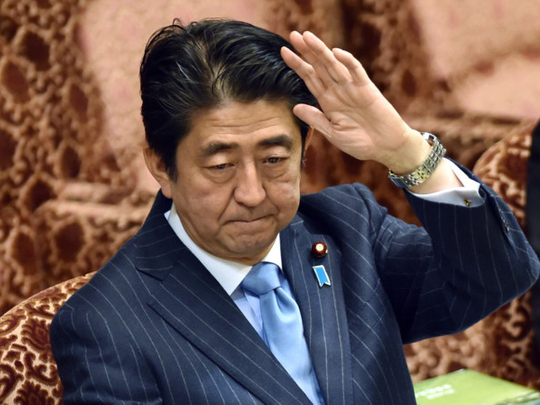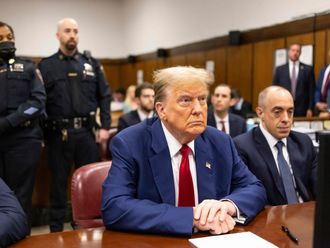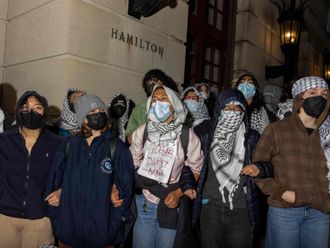
For some, the “eternal condolences” offered by Japanese Prime Minister Shinzo Abe for Americans killed in the Second World War were not enough.
In a speech to the US Congress on Wednesday, the Japanese leader didn’t offer his own apology for Japan’s actions in the war, though he did say he would uphold the views of his predecessors — which would include a 1995 apology by Prime Minister Tomiichi Murayama.
Xinhua, the Chinese state news agency, minced no words. “The nationalist Japanese leader once again failed to deliver an unequivocal apology the world deserves for his country’s heinous systematic war crimes seven decades ago,” a Xinhua writer said in a commentary.
Twenty years after the 1995 apology, Abe faces demands from various quarters — China and the Koreas, some US veterans and lawmakers, and liberals in Japan — to own up to his nation’s responsibility for the Second World War. Some want him to repeat the previous apology in a statement he plans to make in August, the 70th anniversary of the war’s end. It seems unlikely he will. Here’s why:
The Right Wing
A small but vocal right wing, which counts Abe as one of its own, would likely explode if he apologised. Many of its members subscribe to a revisionist view of history that Japanese leaders were unjustly convicted of war crimes by a one-sided international court, and that the country was forced into a war of self-defence after the US blocked oil exports to Japan to try to check its expansion. Abe has in the past made statements that back revisionist views to varying degrees, though he has moderated his public words recently. But even if he wanted to apologise, it would be politically difficult.
Apology Fatigue
Government officials are fond of saying Japan has apologised repeatedly for the war, why do we need to apologise again? It’s a sentiment shared by many Japanese. Though they may accept their country’s responsibility for the Second World War, they increasingly see China’s demands as a tool to gain diplomatic advantage. Constant pressure over the issue of women deceived or forced to work in Japanese military brothels during the war has contributed to growing negative feelings toward South Korea as well.
Should we demand an apology?
Dartmouth professor Jennifer Lind, who has written a book on apologies, says no. While some draw comparisons to Germany’s repeated atonements for the Second World War, she says that’s an exception. Few countries have apologised for violence against others. Japan shouldn’t deny what it did, she says, but the demands for apologies only inflame the situation. “I’m in favour of changing the entire framing of the conversation away from the realm of apologies and toward truth-telling,” she wrote in an email response. “If we want to focus on Japan, we should call upon it to tell the truth.”
Looking ahead to August
The right wing, including some of Abe’s own political appointees, undermines the 1995 apology whenever it questions whether the Nanjing massacre happened or whether foreign women were forced to be sex slaves in the wartime “comfort women” system. That’s why all ears will be on Abe’s 70th anniversary statement.












